
JIVAGO
NGUEZA N'DINDI (Sons d'Africa)
I knew nothing of this singer until my friend Ken A alerted me to him. (Ken is brilliant at sleuthing out obscure yet great new releases that go under the radar of most media, and Portugal is the worst country for getting its product out into the larger world.) Jivago was a veteran of the Angolan semba scene, but there is no info on line except a review on El Sur Records in Tokyo which gives me google translation snippets like "and the other happy?" or "New, two songs of all 8 songs seemed old record has been recorded as a bonus," suggesting that Jivago has rerecorded some of his old hits from the 80s, and they are the ones with accordion instead of keyboard, or vice versa. Born Adan Gonzalves in Luanda in 1954, Jivago had a hit with "Avo Teté" fronting the band Fenomenal in 1984 and he hit again in 1989 with "Ramiro." In 2002, when the civil war ended, he began working on this solo album. It includes those earlier hits added as a bonus as the last two cuts. "Mendonça" was originally recorded in 1992 by Os Kiezos, so I guess he was part of that celebrated outfit, though I don't see him listed in the personnel on Angola 70. Sadly Jivago died, age 66, in September 2020 just before this album was finally released. There are hints of morna and soukous as well as zouk and other Afro-Caribbean sounds. There is also a strong sentimental bond between Brasilian bossa nova and semba, as they are both sung in Portuguese creole. Other similarities are in the use of cavaquinho, acoustic guitar, accordeon and shaken percussion. The African side introduces echo on the guitar, female backing chorus, congas, tapped bottles, and the big room sound of Africa Negra, Sangazuza and their ilk. This is a sweet disc and I am grateful once again to Ken for finding it.
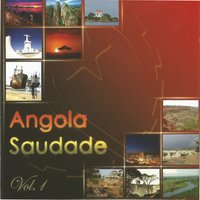
ANGOLAN SAUDADE VOL 1 (Sons d'Afrique)
Angolan music doesn't arrive too often and when it does there is not much fanfare. Also it comes in clumps which is to say you are more likely to encounter a compilation than individual artists. Nevertheless there are many wonderful compilations of Angolan music as I have doubtless said before. My friend Ken B alerted me to the latest which is called Saudade, which we tend to think of as sad ballads full of melancholic longing for the lost land that was decimated by decades of civil war. But it's not at all a downer: there are many sprightly tunes on here. You can find this 18 track compilation on line, on your favorite download site, but you won't find any liner notes, merely the names of the artists and the song titles. This is the current trend and it doesn't help reviewers or those trying to get a handle on the context of the music, especially if their Portuguese is limited to "obrigado" and "o meu amor." From the general sound I would guess this music comes from the mid-70s, and the consistent high quality suggests that Os Jovens do Prenda, the main backing band of that era, play on a lot of these tracks. It's a well-put together compilation and does not overlap with either Soul of Angola or the two volumes of Angola 70's, that appeared on Lusafrica and Buda respectively. The storming "Pachanga Maria" by Os Bongos and "Comboio" by Kiezos did appear on Analog Africa's Angola Soundtrack 1 which was thoroughly annotated. We learn there that both tracks were issued on Rebita Records in 1974; Rebita issued hundreds of records before the start of the civil war in 1975. Diminishing returns has not set in to this old music, and it seems that, once again, here is a rich vein of relatively unknown music still turning up gold nuggets.
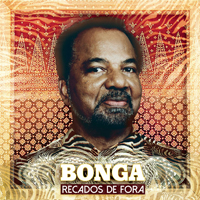
BONGA
RECADOS DE FORA (Lusafrica)
I played the new Bonga album while I was working. It was pleasant, a lot like his other work of course, since it's his zillionth (or 32nd) release. Then it ended and I left the room; when I came back I was humming "St James' Infirmary Blues." Now I often get earworms from what I have listened to, so I put the last track, "Marikota," on again and sure enough, it's that old folk chestnut, which perhaps dates back to 17th century England. This new album is called, in English, Messages from Outside, and we can imagine it refers to the long struggle of Angola for independence, to break out of its confining civil war, which has occupied half of the 74-year-old exile singer's life. There's a dose of "saudade" in the opening cut, "Agua raz," (think Cesaria Evora with more facial hair), but we also hear a classic Argentine tango in "Banza Rémy." Bonga lived in Europe for 30 years, which protected him from the conflict, but also allowed him to beam back messages of protest, admonishing the government to allow free expression and also calling for unification. Most of the songs are in the lively "Semba" style, a buckle-rubbing percolating chug, contrasting with the world-weary voice of the singer.
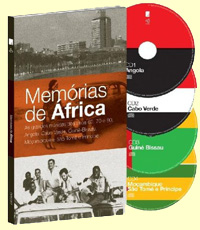
MEMORIAS DE AFRICA
AS GRANDES MUSICAS DOS ANOS 60, 70 E 80. ANGOLA, CABO VERDE, GUINE-BISSAU, MOÇAMBIQUE E SAO TOME E PRINCIPE (Difference 2008 FAROL 85807)
This is an 88-page hardback book with 4 CDs, each devoted to a Lusophone culture in Africa from the 60s through the 1980s. (In case you are wondering, "Lusophone" is when you drop your cellphone down a sewer grate, according to my pal Larry.) This comp is new to me, thanks to fellow DJ David Noyes, who alerted me to it, and since I am always on the quest for this music, specifically, I am thrilled to get hold of a copy. The book is a bit overdone, sort of an extra-illustrated Wikipedia article on each section, with a lot about the geography and climate and not enough about the music. There are personal essays by people connected to the music, including Firmino Pascoal, Angolan musician, Jorge de Jesus Rodrigues, Angolan writer, Virgílio Correia, music promoter in those parts, Juca Delgado, music producer in Guinea Bissau, and Samuel Yana Munguambe, teacher/researcher in Mozambique. As facts about the groups, such as Super Mama Djombo, Cobiana Djazz, Sangazuza, and Africa Negra are hard to come by, it's worth dealing with the "rose bisque"-colored spindly type that carries the english text. What's great is the music, and considering many master tapes were lost in the interim, the sound is excellent. Angola has been well represented by the 5-disc set on Buda Musique and the essential Soul of Angola, a 2-disc set on Lusafrica. There are two duplications from Buda's Angola 70s, which is not much, and it's surprising that Bonga was left off, but two other big names are present: Teta Lando and Carlos Lamartine. That lovelorn "morna" quality from Cabo Verdean music permeated tracks like Teta Lando's "Nizambi" which closes the Angolan disc. There are lots of surprises on here, and they are woven into a tapestry that includes standbys, like Voz de Cabo Verde, who have three entries on the second disc. If you are missing Cesaria Evora, check out the sprightly version of "Sodade" by Marino Silvia which sends her lugubrious rendition packing. Also absent, Bau and Boy Ge Mendes, but it's great to hear a different selection. "O Bernardo" by Ana Firmino is also reminiscent of the late cigar-puffing diva, but has much more joie de vivre and just a twist of saudade. The third disc "Guiné-Bissau" is a sampler of five bands with two or three tracks from each: Super Mama Djombo (taken from their 1978 debut album Na Cambança, including the sublime "Suur di no púbis"), Saba Miniamba, José Carlos Schwarz, N'Kassa Cobra and Zé Manel, the former drummer of Super Mama Djombo. The N'Kassa Cobra tracks are exciting: three come from their 1983 album Unidade luta progresso, and one from their 1982 debut. Not to be missed. The fourth disc features Moçambique along with Sao Tomé & Principe. There's a record skip in the second track, "A uni tenderi" by Conjunto Kwe-Kweti, which should have been taken care of. I guess it adds authenticity. The known factors, Sangazuza, Africa Negra and Os Leonenses are buried in the middle of this set. Preceding them are some folkloric tracks which gradually reveal some latin currents in the guitar rhythms. But when Africa Negra cut loose on "Aninha" you know you have arrived somewhere. Not only is it the standout on this side, it will make you want to immediately start collecting all their discs.

PAULO FLORES
BOLO DE ANIVERSARIO (The Artist)
Blind (or deaf?) listening, like blind tasting, can be quite a revelation. After putting this disc on, at first I thought that this was a far-reaching Brasilian album sung in Portuguese, showing influences from Colombia, Peru and other parts of Latin America, including the Antilles. Then I learned it was Angolan and some other influences, more African, came into focus. Put it down to globalization: everyone's wired to cyberspace, but also artists are touring and hearing music from other countries, not to mention the big changes in access and performing in Angola since the end of the civil war. There's a current of the morna music of Cabo Verde underlying "Cokô," one of the outstanding tracks on the new disc. However it appears that song itself is a cover of a Franco & OK Jazz original. Flores has released 14 albums since 1989, with a hiatus from 2001 to 2012. His 2013 album had a song, "Mama Lélé," with Axé drumming, which you could easily mistake for Brasilian. I suppose he has been overshadowed by Carlos Lamartine and Bonga, at least outside his homeland. He was only known to me previously by single tracks on Angola 80s and Angola 90s, from the fine anthology on Buda Musique. His genre is semba music so it does have touches of Congo, Carribean, and I guess the lilting accordion came via sailors too.
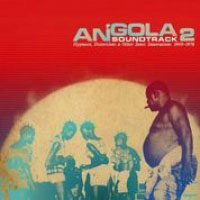
ANGOLA SOUNDTRACK 2 (Analog Africa 075)
Samy Ben Redjeb of Analog Africa has an expansive vision. His Angola Soundtrack (which came out in 2011) highlighted tunes from the lesser-known but musically vibrant country of Angola, and he has returned from Luanda with a second helping, equally tasty, focussing on the 1970s, the period of transition from colonial repression to final Independence from Portugal in 1975. But joy was shortlived as the country plunged into a protracted civil war. This release does overlap with the blissful Soul of Angola (Lusafrica, 2001) double album, with the inclusion of Tony Von's "N'Hoca", Urbana Do Castro's "Kia Lomingo," Oscar Neves' "Mabele," and Os Kiezos' "Saudades de Luanda." Four duplications may seem like a high number but that older CD, which remains one of the best Angolan compilations made, is now out-of-print. While some of the names are familiar, most of these artists are only known through one track on another 5-CD compilation series put out by Buda Musique (Angola 60s to 90s), so hearing more from them is welcome. Samy also brings additional songs from his favorites: Os Kiezos, Jovens do Prenda, Dimba Diangola, Quim Manuel, Africa Ritmos and Africa Show who appeared on his first compilation. As usual with Analog Africa there is a 44-page deluxe booklet with rare photos, saved just in the nick of time from the ravages of tropical living, or gleaned from newspaper morgues. The rhythms are traditionally Angolan which have some overlap, aurally, with Brasil and the repetition of them may seem like the music is stuck in the groove to non-initiates. The guitars are picked and speedy (many guitarists started out on home-made guitars using tin cans and bicycle cables so there is a brittle metallic sound that they employ and enjoy); the percussion is generated by bongos, reco reco (also called dikanza, the local guiro), chocalho (shaker), caixa (snare drum) and other instruments normally associated with samba. When things let up, it's a wonderfully echoey dreamy track called "Meca" by the oddly-named Levis Vercky's (Is his first name a typo for Elvis or did he like denim? And Vercky's is, of course, the famed Congolese saxman, but this one is just a vocalist), then the mellow "Inspiraçao de Nito" by Africa Show 73. Angola has a strong musical identity, though there are inevitably some influences from Cabo Verde and other Portuguese diaspora countries, neighbors Southern Africa, Congo, as well as the Caribbean, and strong folkloric currents. Due to war and economic hardship there has never been much of a recording industry in Angola, only three recording companies who put out a scattering of singles (800 during the 1970s according to Samy's source), so the legacy is condensed but choice. The story of the live music scene is detailed with interviews with surviving musicians and their families and rare documents found in the National Library in Luanda. The album has a minute of silence at the end, followed by a bonus track (a trick borrowed from Gunter Gretz at PAM?), "Fuguei na escola (I ran away from school)" by Teta Lando on acoustic guitar -- his take on the "Guantanamera" tune. We are grateful to Samy for returning to Angola for another serving of this fabled music, and can only wonder where his peregrinations will take him next.

ANGOLA SOUNDTRACK
Special Sounds from Luanda 1965-78 (Analog Africa AACD069)
Before its civil war that lasted for the last quarter of the twentieth century, Angola had a thriving music scene. Despite the strife, bands recorded some great tracks as evidenced by the 5-disc series ANGOLA 60s, 70s, 80s, 90s on Buda Musique. There is the also out-of-print Soul of Angola (on Lusafrica) in my Africa Top 50, a double disc that celebrated the decade from 1965 to 75, the period under consideration again here. Os Kiezos, Os Bongos, Jovens do Prenda, David Zee are the artists who return for this new look. The big names, Carlos Lamartine, Ruy Mingas, are not here, but there are no disappointments (Teta Lando shows up singing in the last track with Africa Show). This is a fine set & it's safe to say that all the tracks are rarities. There are pachangas and other Cuban styles, Congolese touches on the guitar, as well as Semba, Rebenta and home-cooked carnaval music. The only track I had heard before was the storming instrumental "Kazucuta" by Os Bongos which was on Angola 74-78. As usual with Analog Africa a download doesn't suffice because there's a deluxe booklet with photos, sleeves and other ephemera to engage while you enjoy the music. It also details Samy Ben Redjeb's difficult journey to bring back the music -- not all of it from Angola. In fact he was in Barranquilla, Colombia when he heard "Tira Sapato" and realised the importance of this music (that has strong Caribbean currents like merengue) to those of us in the New World. But more than just a narrative of Samy's bouts with food poisoning and record buying there is a history of each singer and song presented. Ben Redjeb spent his time in Angola well, meeting the artists and recording their memories. In the case of Vaté Costa of Os Kiezos, this was his last interview. Consequently this booklet is an important document. The sequence is great and if you were not fortunate enough to get the Angola 60s-90s CDs from Buda (now out of print) you should do yourself a favour and check this out.

CARLOS LAMARTINE
HISTORIAS DA CASA VELHA (Akwaaba AKW003)
Despite constant net babble about the end of CDs there are still excellent labels finding great music & promoting it, either in traditional formats, or as downloadable MP3s. AKWAABA has opted for the non-material approach: the risk is the product is quite mutable and subject to theft but their noble mission, to actually pay the artists fairly for their songs, is enough to deter even the worst peg-legged parrot-toting pirates -- or should be. Most of us were unaware of the great music being made in Angola because the country was isolated for decades by civil war. I had only heard of Trio AKA, Waldemar Bastos and Bonga until Buda Musique launched their excellent series of compilations. Carlos Lamartine has always been a shadowy figure in this history until very recently. Ricardo Lemvo covers "N'vunda ku muceque" on his latest album (the original can be found on ANGOLA 90s), and the Angola to Brasil mash-up album COMFUSOES 1 included no less than two tracks by Lamartine, remixed by Brasilian DJs (They are included here, in their original form). In the 60s Carlos Lamartine co-founded the Kissuela band with Bonga. After gigging with various top bands in Luanda he became lead singer for Os Aguias Reias (The Royal Eagles) in 1970. During the 70s he often recorded as a solo act, backed by Os Merengues, one of the hot political semba bands of the era. Semba developed independently from Brasilian samba though shares certain rhythms and even a language (Kimbundu) and both have roots in traditional dances from Angola and what is now the Democratic Republic of Congo. Benjamin Lebrave of Akwaaba has put together an essential compilation of twenty tracks by Lamartine, from his golden era. These have been remastered, though the sound on the first few is a bit thin. Nevertheless this is a fantastic collection. A PDF with the download gives an English synopsis of the lyrics; many of the songs are a call to arms (the catchy "Faço-te este apelo, Camarada"), or praise of the MPLA, while some detail proud moments of Angolan history. The rhythms are often carried by the guitar, rather than the percussionist, so skittering lead guitars bop about over the tremelo vamp. You can sample the songs on amazon, but I guarantee you a good time! The ballads are lovely, until you read they are about funerals: "The rooster sang, saying he was bewitched"! "Acorda Lumumba" offers solidarity with the Zairois against the tyrant Mobutu. "Kubonga" sounds familiar, it certainly has a catchy riff and a great outtro. The album ends with another classic "Kimbemba": a mournful ditty with a soprano saxophonist locked in the bathroom, pleading to get out. There is also an interview with Lamartine (who now lives in Brasil) here.
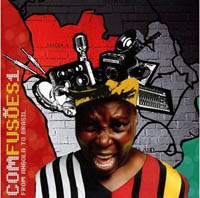
COM FUSOES 1: FROM ANGOLA TO BRAZIL
(Out Here Records B0025Y6S3M)
There's a strong connection between Angola and Brasil and now that the African colony has emerged from its endless civil war, the rich musical culture is coming back to prominence. Bonga is the brand name superstar but 30 years ago Teta Lando, Artur Nunes and Carlos Lamartine were equally big names. Like Cabo Verde, Angola had its own traditions which absorbed fado and other mournful sounds from the Portuguese motherland of the colonists. And of course those high-colonic colonists brought Angolans in chains to Brasil to work their plantations and kept doing it until very late in the 19th century. Some fared better than others. Darwin describes various Brasilian plantations and the plight of their slaves in his gripping Voyage of the Beagle. He believes the slaves are finer people than the Portuguese (good natured and athletic) and will ultimately be the rulers: "I hope the day will come when they will assert their own rights and forget to avenge their wrongs." On 14th June 1832 he went to a concert by a celebrated pianoforte player: "He said Mozart's overtures were too easy. I suppose in the same proportion as the music which he played was too hard for me to enjoy." Com Fusões however is easy to enjoy. There is a pun in the title, both confusion, and "with fusion" are signaled. DJ Dolores rips outta the speakers with her "Merengue Rebetika," an instrumental remix of Paulinho Pinheiro, that is the high point for me, even if it does have a House beat at the core. (The original is on ANGOLA 70s part of the great & sadly out-of-print Buda series of classic Angolan hits; the Avozinho track comes from volume two of ANGOLA 70s.) There's a rap which adds the contemporary bullshit factor to "Cada Cidadão Deve Sentir-se um Soldado" (which I think means every citizen should become a soldier) by Kisangela. You can listen to preview samples on Amazon. I think you'll agree the remixing enhances the originals & gives a fresh perspective on some classic tunes.
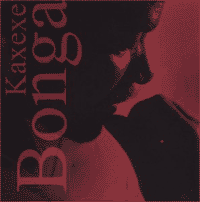
BONGA
KAXEXE (Lusafrica TSQ-CD9037 )
Either I'm in a very good mood (sitting in the garden on a sunny day, sewing), or Bonga just got a lot better. His new album is so consistently good I may have to go back and listen to his other records. He is backed by a small versatile combo, Semba Master, that uses accordeon sparingly and cavaquinho on three tracks. This gives the album a more Brasilian feeling -- which means my expectations from it are lower! The title cut "Kaxexe" reminds me of Dida Banda Feminina. The songs are well balanced between ballads and up-tempo jaunts. His whiskey-smoked voice occasionally sounds so tired it makes you want to snooze too. For dozing on a sunny afternoon, it's perfect.
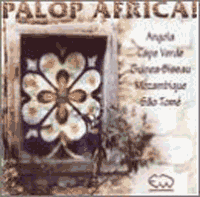
VARIOUS ARTISTS
PALOP AFRICA! (Earthworks STEW46CD)
I wasn't aware of the African music connection when I visited Portugal a decade ago. The Brazilian influence was everywhere and in an odd reversal of countries which are full of peoples from their former colonies, the goal of everyone I met in Portugal was to get out and move to Brazil. Everything stopped at 7 p.m. when the Brazilian soap operas came on television. While I did know about Portugal's colonial past I was ignorant of the African music scene in Lisbon that revolves around musicians from the five former African colonies in Africa (that were established over 500 years ago). This release from Stern's/Earthworks documents this scene: PALOP AFRICA! features bands that originated in Guinea-Bissau, Angola, Cape Verde, São Tome, and Mozambique. Among them is Africa Negra, a personal favourite as their music makes a nice conjunction somewhere between soukous and Nigerian highlife with a warbly flanged rhythm guitar. They appeared on two previous compilations: 1975-95 INDEPENDENCIA and AFROPEA 3: TELLING STORIES TO THE SEA, and have a new release on the Sons D'Afrique label called QUE COLO DE ANZU. All this despite the fact that it's virtually impossible to get guitar strings on the island of São Tome. The Angolans have a musical style called Semba which is akin to Brazilian Samba, and there's a fine example of it here from Paulo Flores, one of that country's biggest stars. There's a strong South African influence on the music of G. Mario Ntimana, the self-styled King of Marrabenta. Don Kikas from Angola has worked with zouk musicians in Paris and is the hottest thing in Kizomba as that French Caribbean sound has caught on there big time. In addition to the Brazilian influence you can smell the salt air of the sea shanties underlining the accordion (gaita) parts to "Cabra Preta" by Sema Lopi. They are a rootsy funana band using a ferro (metal rod) as percussion and add a balance to the slicker sounds of this compelling compilation.
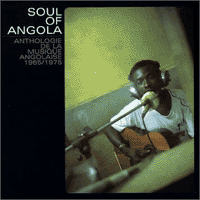
VARIOUS ARTISTS
SOUL OF ANGOLA (Lusafrica 362392)
Angola was in the news in February 2002 with the reported death of Jonas Savimbi who fought the power longer than anyone could remember. A buddy of Reagan (Kissinger gave him $24 million) and assorted African tyrants, Savimbi turned the civil war into his personal crusade for 40 years and killed & maimed innocent peasants along the way (funded by Yanqui dollars). For the full account of the absurdity of this war (At one point Cuban mercenaries were defending Shell oil rigs from the South-African-backed UNITA forces) read Ryszard Kapuscinski's ANOTHER DAY OF LIFE (Penguin). It's sad but true that strife makes a country's music compelling, gives it an edge and urgency that complacency destroys. There is an inherent mournfulness to African Lusophone music. Perhaps the appeal of Cesaria Evora stems from that sense of loss and longing in her voice. In the 1960s, the fascist government banned carnaval, then in a reversal, established Voz de Angola radio in 1968 to promote indigenous cultural programming. SOUL OF ANGOLA is a two disc set chronicling the years 1965-75. The sequencing gives each artist a couple or more cuts. In these recordings the instrumentation is always simple, the effects limited to whatever toys the guitarist has picked up. Local rhythms the semba and rebita are augmented by the usual influences: merengue and Afro-Cubism from the Caribbean, Samba from Brasil, Congolese rumba (Tony de Fumo). The musicians cover Kinshasa's Dr Nico (Oscar Neves' "N'zambi") & Ghanaian highlife, showing the wide influences of those styles, and there's a hint of kwela, but there is an originality that is part of the Portuguese musical diaspora: a manic sea-shantiness in minor keys akin to Cabo Verdean and Sao Tomean music. This double CD sent me spinning the Buda Musique series (ANGOLA 60s, ANGOLA 70s) that came out on five discs in 1999. There is a little duplication of one or two crucial tracks: Avozinho's "Mama Mama Divua Dimae," Os Kiezos' "Princess Rita," Arturo Nunes' "Tia," but there's plenty of grade A stuff to keep you coming back for more. Don't worry that Bonga is absent, there are fresh discoveries waiting to be made like Tony Von and Luis Visconde. After the era covered by these discs, artists like Trio Aka and Matadidi brought the soukous feel to their country's music, but there's a distinct Angolan sound audible in the sixties and seventies, and THE SOUL OF ANGOLA recovers it beautifully.
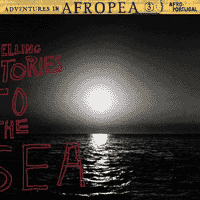
VARIOUS ARTISTS
TELLING STORIES TO THE SEA (Warner Bros/Luaka Bop 45669-2 1995)
After a couple of successful sorties to Brazil, David Byrne and his lackeys have now ransacked the archives of Lusophone music from Africa to produce Adventures in Afropea 3: Afro-Portugal. The scattered cultures of Africa that share Portuguese as a language include Angola and the dozen tiny islands of São Tomé, Principé and Cape Verde, from whence come the sultry song-stylings of the immensely popular Césaria Evora. Evora is represented in two great tracks including the acoustic "Sodade" which calls to mind Brasilian samba. But the unknown artists here are equally impressive. Tulipa Negra provides an anthemic speedy merengue; "Vizinha ka bale (My neighbour's no good)" by Jacinta Sanches has all the raw energy of early Zouk; and a song about being bitten by a dog by Africa Negra from São Tomé adding a wonderfully wobbly tremelo guitar solo that unleashes the endorphin rush of an all-night dance party.